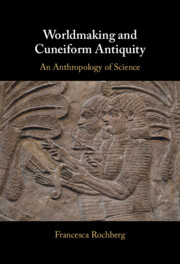2 results

Worldmaking and Cuneiform Antiquity
- An Anthropology of Science
-
- Published online:
- 09 January 2025
- Print publication:
- 09 January 2025
Chapter 6 - Bringing the Phenomenal World into View
-
-
- Book:
- Wittgenstein on Philosophy, Objectivity, and Meaning
- Published online:
- 15 August 2019
- Print publication:
- 15 August 2019, pp 100-118
-
- Chapter
- Export citation

